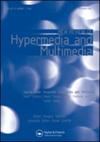Introduction
IF 0.8
4区 计算机科学
Q3 COMPUTER SCIENCE, INFORMATION SYSTEMS
引用次数: 0
Abstract
ACM UMAP is an annual conference on user modeling, adaptation and personalization. User modeling concerns the process of understanding the user’s needs, preferences, interests, knowledge and other aspects. This is achieved by reasoning about and extracting knowledge from user data, which includes both data that is explicitly provided by the user—such as profile data—and implicitly gathered usage data—such as browsing data. Adaptation and personalization techniques exploit the user models in order to better tailor a software system, such as a website, to the user needs. Recommender systems are the best known type of personalized systems, but the field is much wider and includes among others personalized search, adaptive user interfaces, personalized advice, and personalized technology-enhanced learning. This special issue contains extended versions of selected papers from UMAP 2017, the 25th edition of the conference series. The conference was hosted in Bratislava, Slovakia, from 9 to 12 July 2017. The conference consisted of five tracks that represent the variety of disciplines and application areas in which user modeling, adaptation and personalization play a role. User interface aspects, including adaptive presentation and navigation, were covered by the tracks Intelligent User Interfaces and Adaptive Hypermedia. As one of the most visible and largest application area of personalization is the Social Web, we received in the corresponding track submissions that both analyzed user behavior to function as input for personalization, as well as the effect of personalization on user behavior. Being the most prominent and most applied adaptive technique, Recommender Systems were given a dedicated track as well. Finally, we dedicated a track to the field of Technology-Enhanced Adaptive Learning, as this is an application area with important and tangible impacts on society. The papers in this special issue belong to the latter two areas. Three papers are situated in the field of Technology-Enhanced Learning. The first paper, “Analysis and Design of Mastery Learning Criteria” (Pelánek and Řihák), shows that, under the assumption of isolated skills, the decision over skill mastery, and whether a system should let the student move on to the next skill to learn, can rest on a simple exponential moving average rather than on the more sophisticated Bayesian and logistic approaches to learner modeling. They also show that the choice of an appropriate mastery threshold and of the source of information is more influential than the choice of the learner modeling technique. The second paper focuses on open learner models, which is an approach for making a student’s learner model explicit to the student, in order to enhance reflection, self-awareness and self-regulation of the learning process. In “Navigation Support in Complex Learner Models: Assessing Visual Design Alternatives” (Guerra, Schunn, Bull, BarríaPineda and Brusilovsky), six alternative prototypes were investigated in two control studies. The results provide several insights in how to balance between ease of use and complexity during the design of such open learner models, and open several lines of future research.介绍
ACM UMAP是一个关于用户建模、适应和个性化的年度会议。用户建模涉及了解用户的需求、偏好、兴趣、知识等方面的过程。这是通过对用户数据进行推理并从中提取知识来实现的,其中既包括用户显式提供的数据(如概要数据),也包括隐式收集的使用数据(如浏览数据)。适应和个性化技术利用用户模型,以便更好地定制软件系统,如网站,以满足用户需求。推荐系统是最著名的个性化系统类型,但这个领域要广泛得多,包括个性化搜索、自适应用户界面、个性化建议和个性化技术增强学习。本期特刊包含了UMAP 2017(第25版会议系列)精选论文的扩展版本。会议于2017年7月9日至12日在斯洛伐克布拉迪斯拉发举行。会议由五个专题组成,代表了用户建模、适应和个性化发挥作用的各种学科和应用领域。用户界面方面,包括自适应表示和导航,将在智能用户界面和自适应超媒体专题中讨论。社会化网络是个性化最明显和最大的应用领域之一,我们收到了相应的跟踪提交,这些提交既分析了作为个性化输入的用户行为,也分析了个性化对用户行为的影响。作为最突出和应用最广泛的自适应技术,推荐系统也被赋予了专门的轨道。最后,我们专门讨论了技术增强适应性学习领域,因为这是一个对社会具有重要和切实影响的应用领域。本期特刊的论文属于后两个领域。有三篇论文是关于技术促进学习的。第一篇论文“精通学习标准的分析和设计”(Pelánek和Řihák)表明,在孤立技能的假设下,对技能掌握的决定,以及系统是否应该让学生继续学习下一个技能,可以依赖于简单的指数移动平均,而不是更复杂的贝叶斯和逻辑方法来学习建模。他们还表明,选择适当的掌握阈值和信息来源比选择学习者建模技术更有影响力。第二篇论文的重点是开放式学习者模式,开放式学习者模式是一种将学生的学习者模式向学生明确的方法,以增强学生对学习过程的反思、自我意识和自我调节。在“复杂学习者模型中的导航支持:评估视觉设计选择”(Guerra, Schunn, Bull, BarríaPineda和Brusilovsky)中,在两个对照研究中调查了六个备选原型。这些结果为如何在这种开放式学习模型的设计过程中平衡易用性和复杂性提供了一些见解,并为未来的研究开辟了几条思路。
本文章由计算机程序翻译,如有差异,请以英文原文为准。
求助全文
约1分钟内获得全文
求助全文
来源期刊

New Review of Hypermedia and Multimedia
COMPUTER SCIENCE, INFORMATION SYSTEMS-
CiteScore
3.40
自引率
0.00%
发文量
4
审稿时长
>12 weeks
期刊介绍:
The New Review of Hypermedia and Multimedia (NRHM) is an interdisciplinary journal providing a focus for research covering practical and theoretical developments in hypermedia, hypertext, and interactive multimedia.
 求助内容:
求助内容: 应助结果提醒方式:
应助结果提醒方式:


